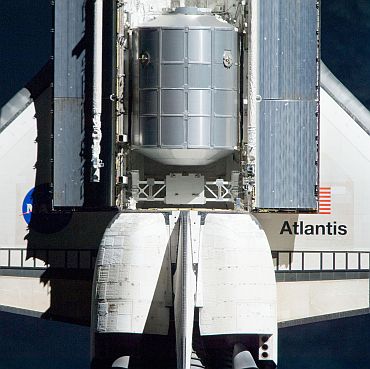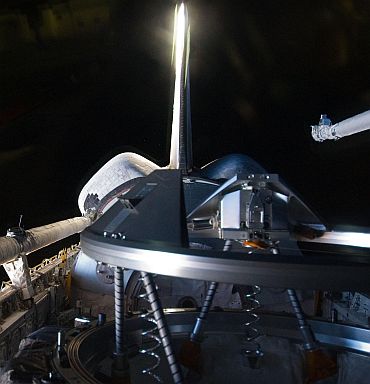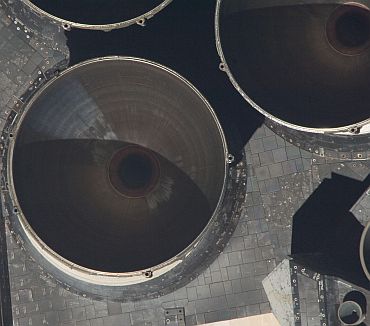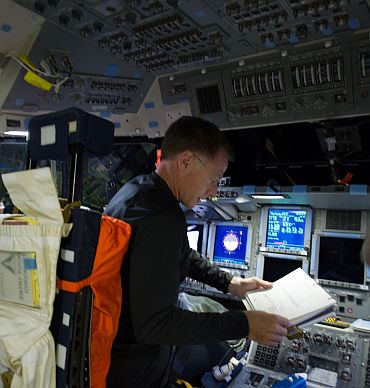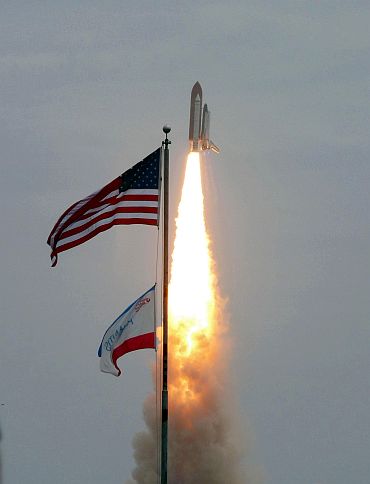 | « Back to article | Print this article |
Shuttle Atlantis begins final trip back home
US shuttle Atlantis has separated from the International Space Station for the last time to begin one final trip back to Earth.
Atlantis was launched on July 8 on the 135th and last voyage of NASA's 30-year space shuttle programme. The orbiter delivered four astronauts and a horde of spare parts for the space laboratory, and is now packed full of trash to take back to Earth.
The astronauts closed the hatches between the shuttle and the station on Monday and undocked and departed from the outpost on Tuesday at 2:28 a.m. EDT.
"Atlantis departing for the last time," station astronaut said while ringing a bell as the orbiter backed away.
Click on NEXT to read further...
Shuttle Atlantis begins final trip back home
"Thank you for your 12 docked missions to the International Space Station. We'll miss you guys. Godspeed, soft landing."
Collectively, NASA's space shuttles spent about 40 weeks over 37 missions, helping to assemble the football-field sized laboratory.
"The International Space Station now enters the era of utilization," Atlantis commander Chris Ferguson said.
Shuttle Atlantis begins final trip back home
On this mission, Atlantis spent 8 days, 15 hours and 21 minutes docked to the outpost.
Ferguson plans to land the spacecraft on July 21 for one last time at NASA's Kennedy Space Centre in Florida.
Ferguson and his crew began their 12th day in space on Monday just after 10 p.m. EDT,
Shuttle Atlantis begins final trip back home
Following the undocking, astronauts aboard the space station rotated their vehicle about 90 degrees to allow the shuttle astronauts to take detailed photos of the outpost from many angles to document the status of its exterior.
The shuttle's crew members will spend the rest of their day performing one final inspection of the orbiter's heat shield to ensure the sensitive tiles are intact and ready to protect the vehicle during re-entry through Earth's atmosphere.
"The undocking day will be a very busy day; we have a great deal of activities to do," shuttle flight director Kwatsi Alibaruho told media persons during a briefing.
Shuttle Atlantis begins final trip back home
Atlantis' last voyage is the end not just for the space shuttles, but for the thousands of NASA workers who will soon be taking on non-shuttle related jobs within the agency or moving on entirely.
"After my shift tomorrow, we'll commend the crew and the mission to the care of the entry team," Alibaruho said, adding "The emotions feel a bit more intense today than they felt back on flight day two or flight day three."
Alibaruho and his on-orbit flight control team will hand over mission control duties to Tony Ceccacci, lead shuttle re-entry flight director, and his team.
Shuttle Atlantis begins final trip back home
"Personally, I feel a great sense of honor and pride at being able to serve as a shuttle flight director," Alibaruho said.
After Atlantis lands, the vehicle and its siblings Discovery and Endeavour will be readied to go on display in museums.
Atlantis is promised to the Kennedy Space Centre's visitors centre, while Discovery will go to the Smithsonian's National Air and Space Museum near Washington, DC, and Endeavour will be placed at the California Science Centre in Los Angeles.
In the absence of the shuttles, NASA will rely on Russian spacecraft to carry US astronauts to the ISS, until private American spacecraft are ready to take over the job.
Meanwhile, NASA will begin building a heavy-lift rocket and crew capsule to carry astronauts beyond low-Earth orbit, ultimately to Mars.
